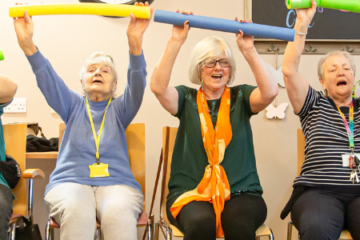One of the questions I am asked most often is `what is the difference between dementia and Alzheimer’s’. The answer is really simple; dementia is an overarching, umbrella term, and Alzheimer’s is a type of dementia. Under the `umbrella’ of dementia you have other types, for example, vascular dementia, Lewy Body Dementia, Frontal Temporal Dementia and Parkinson’s Disease. Remember, you are not alone – around 900,000 people in the UK have dementia. About 520,000 of these people have dementia caused by Alzheimer’s disease.
In this blog I will talk about feelings and emotions and how an Alzheimer’s diagnosis is often met with disbelief, denial and shock by the person and their loved ones. There is no right or wrong way to respond to a diagnosis, only a personal one that is as unique to us as we are unique as individuals.
These include adjusting to living with dementia, managing any symptoms you have and planning for the future. Managing your feelings and your relationships and how they may change will need to be considered at a time when you will find it most difficult, or least able to do just this.
Tips for handling their emotional responses:
- Always try to put yourself in their shoes and try to understand how the person living with dementia might feel and why they might feel this way.
- In the first instance, consider the context of what is being said. Look beyond what your loved one is saying to find the meaning behind the words and respond to the feelings they may be expressing.
- As a care partner or family member respond to the perceived emotions. Recognise and respect feelings regardless of whether they are reacting to something serious or trivial, or maybe something you cannot comprehend.
- Don’t dismiss their worries or make them feel like their feelings are invalid. Always listen and show them that you genuinely care about them.
- However, it’s also good to refocus their attention. Instead of letting them dwell on negative thoughts and feelings, rather try to redirect the conversation. It’s all about carefully listening and following the flow of the conversation. You can use simple redirection techniques, for example `You were telling me about your daughter, Susan’, if somebody loses track of what they were saying.
- Remind yourself to live in and enjoy the moment. Don’t think too much about the future, respond to how the feelings they’re expressing now.
Expressing strong emotions can be a result of unmet need which carers may be able to pinpoint and meet this unmet need. It can also be a result of them simply not being able to think clearly about the situation and overreacting, in which case you just need to be patient and reassure them that everything is okay.
Managing the emotional needs of someone with dementia (and your own) can often feel like a daunting task. What matters is that you try, taking time for yourself if you can. Connecting on an emotional level is just as important as connecting through a shared history. For the person living with dementia factual recall may be diminished but emotions and emotional responses will be intact. Each person is still an individual, and how you respond in any situation should be personal to them. Be present and show them that you care; that is the basis of a supportive relationship with your loved one.
Alzheimer’s Awareness Month is held every September. Please keep an eye our website and social media channels to see how we will be helping to raise awareness over the next few weeks.


